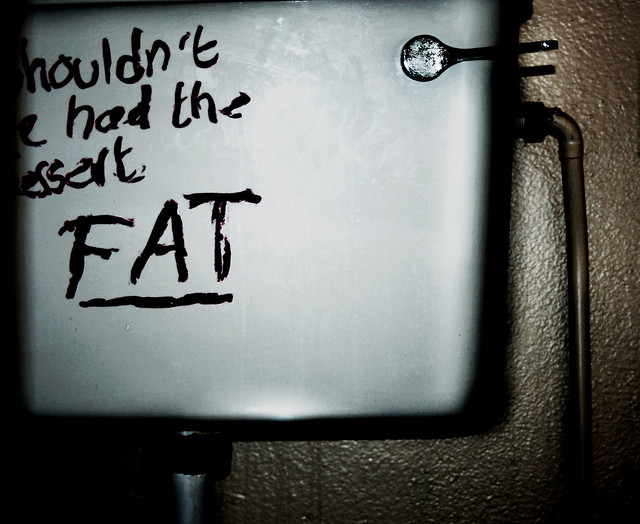
Adam Richman, host of the TV hit Man Versus Food, made recent news as his new show for the Travel Channel was postponed due to a social media rant that he delivered via Twitter. The conversation started with a Tweet that led to him calling people offensive names, and encouraging one reader to commit suicide.
Adam later apologized for his comments, but his actions reminded me how important it is for people to understand a few basics about those with eating disorders.
1. You won’t know who around you is struggling.
Up to 24 million people of all ages and genders suffer from an eating disorder (anorexia, bulimia and binge eating disorder) in the U.S. 95% of those who have eating disorders are reported by adolescents and emerging adults. Those who suffer with eating disorders work very hard to keep their struggles a secret.
You also cannot always tell by looking at a person. Not all people with disorders are under-weight, and not all skinny people are affected. In fact, 70 percent of women with eating disorders are at or above what’s considered a “healthy” weight (Source)
It is difficult to know the difference between those who use unsafe dietary practices, and those who trapped in an eating disorder. Over one-half of teenage girls and nearly one-third of teenage boys use unhealthy weight control behaviors such as skipping meals, fasting, smoking cigarettes, vomiting, and taking laxatives.17 (Statistics from the National Association of Anorexa Nervosa and Associated Disorders).
Most people believe that eating disorders only affect women; however, eating disorders affect men and women. Because of this stereotype, many men are ashamed to get help.
Don’t make assumptions about your friends If you have true concerns about your friend’s health, then ask them.
2. Eating disorders are more than wanting to look prettier.

© 2011 Laura Lewis, Flickr | CC-BY | via Wylio
Eating disorders often get misunderstood as someone who wants to be skinny or prettier. Eating disorders are not simply someone struggling with their body image. Almost 50% of people with eating disorders meet the criteria for depression (Source). While body image can be the cause, it is not the entire problem. Eating disorders can spring from a variety of causes.
Minimizing their struggles to an unhealthy body image, and their need to memorize a verse about God’s love for them will only build walls, and leave them feeling misunderstood.
3. People with eating disorders need professional help.
Eating disorders can be life threatening, and it is crucial to have a team of supporters to help them in their journey. Eating disorders are dangerous because they affect a person’s physical, emotional, and mental development. The mortality rate associated with anorexia nervosa is 12 times higher than the death rate associated with all causes of death for females 15-24 years. (Source) If a friend has sworn you to secrecy, break the silence, and force them to get help starting with those who know the individual.
As a support network is built, professional help is essential. Here is a list of starting locations that I found on-line (Simply Google, “Christian Eating Disorder Treatement Centers”)
4. People with eating disorders still need friends.

Anytime that someone struggles with an eating disorder, the diagnosis can become a wall that can separate them further from others. While you are not a therapist and cannot give them medical assistance, you can still be their friend.
Your friend is still the same person. Your relationship does not have to center on their struggles. Rediscover the original causes of your relationship, and focus on them. Seek out things to do that will allow you both to enjoy your surroundings, and build on other aspects of your friendship.
5. They need safe places.
Obesity is a national health crisis. Like other medical issues, jokes and mockery of those affected should be removed from the public sphere. Our media is filled with jokes about those who are obese. Do those who are obese know that feel accepted by you, and know they are loved? Our society is in need of individuals who are willing to stand up against those who make weight jokes. Indirect comments about clothing, exercise, and consumption of food. Jokes about eating disorders (purging, binging, and other aspects of these diseases) should not be accepted.
Dr. G. David Boyd is the Founder and Managing Director of EA Resources.






 Adam Richman made recent news as his new TV show for the Travel Channel was postponed due to a social media rant that he delivered via Twitter. The conversation started with a Tweet…
Adam Richman made recent news as his new TV show for the Travel Channel was postponed due to a social media rant that he delivered via Twitter. The conversation started with a Tweet…